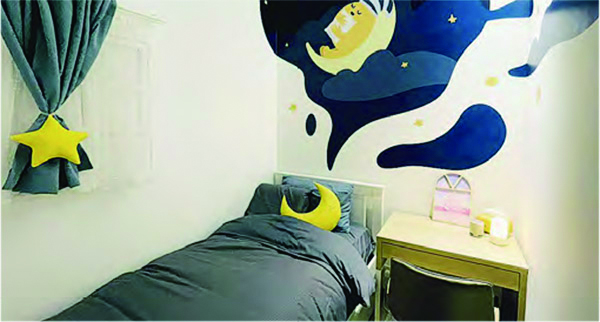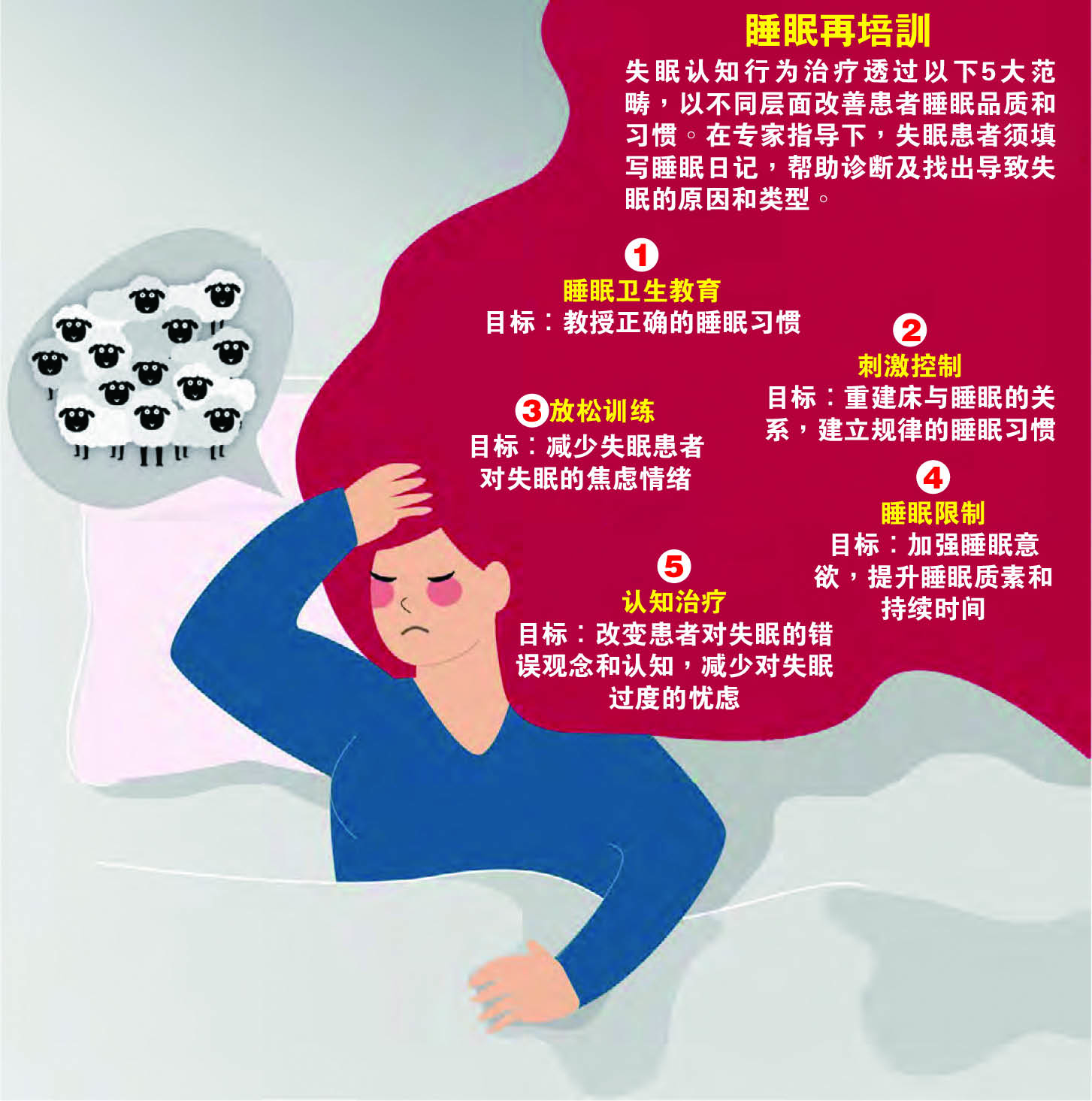Relearn sleep patterns, cognitive behavior, and cure insomnia
[ad_1]
Text◆Ye Kaixin “Ming Pao”
I spent a sleepless night, tossing and turning, no matter how many sheep I counted, I still couldn’t fall asleep. You may have experienced this feeling of “waiting for the dawn”.
The biggest fear is that the situation will continue and evolve into chronic insomnia. I am worried about the different side effects of sleeping pills; I am also afraid of co-morbidities, including sleep apnea, restless legs, or even depression…
(Hong Kong News) Is insomnia really so scary? Do I have to take sleeping pills? Experts solve the puzzle: To treat insomnia, the first step is to learn to sleep again.
When faced with insomnia, I always hear different advice, “Relax, find ways to reduce stress, be stress-free, feel relaxed, and naturally sleep well.” Some “expert” friends also say, “Insomnia may be related to emotional illness, so deal with it properly.” If you have emotional problems, you can have a good sleep.”

non-drug treatment
Wing Rung-kwok, chairman of the Department of Psychiatry at the Chinese University of Hong Kong, pointed out that these statements are not entirely correct. “Insomnia is actually a sleep disorder. In the past, it was mostly attributed to stress and emotional problems. However, after more than 20 years of research, we have found that these factors are not the cause.” The main cause of insomnia. On the contrary, just worrying about not being able to sleep can already cause stress and lead to insomnia.”
Some people use sleeping pills indiscriminately and do not receive treatment for chronic insomnia, which worsens the problem and is more likely to evolve from occasional insomnia to chronic insomnia. “The current first-line treatment for chronic insomnia in the medical community is cognitive behavioral therapy for insomnia. Studies have confirmed that after receiving treatment, 40% of patients with chronic insomnia are cured and 60% of their condition improves.”
“Cognitive behavioral therapy for insomnia is a sleep-related psychological and behavioral treatment. It is a non-drug treatment method. The National Institutes of Health (NIH) confirmed it in 2005 as an effective method for treating chronic insomnia. Research findings “Cognitive behavioral therapy for insomnia can not only reduce patients’ sleep distress at night, but also effectively improve their mental state during the day.”
Insomnia accompanied by other diseases
But in fact, many patients with insomnia are accompanied by other diseases. Rong Runguo explained: “For example, it is comorbidities such as mood disorders, depression or anxiety disorders; or other sleep disorders, such as restless legs, sleep apnea, etc. Only by understanding the relevant causes can doctors decide on treatment plans. However, current treatments The general trend is to first adopt non-drug treatment, that is, cognitive behavioral therapy, and then consider whether to add drugs as auxiliary treatment according to the condition.”
Cognitive behavioral therapy for insomnia is a series of intervention treatments that target behavior, cognition and factors that cause insomnia. Research has proven that it has longer-lasting effects than medications and can also help reduce the dosage of sleeping pills taken by patients. Treatment includes 5 major areas (see “Sleep Retraining” in the article), and the purpose is to teach patients to learn to sleep again.
Chen Yinyan, Research Assistant Professor of the Department of Psychiatry at CUHK, said: “Daily behavioral habits actually affect sleep. Cognitive behavioral therapy uses sleep education and cognitive and behavioral strategies for insomnia. It can not only treat insomnia, but also prevent it.”
An insomnia study in which CUHK participated found that high-risk adolescents with a family history of insomnia who received cognitive behavioral therapy for insomnia had a risk of insomnia that was more than 70% lower than those in the control group. The results of the study will be published in the Journal of Pediatric Medicine in 2021.
Chen Yinyan explained: “During the treatment, patients must relearn sleep patterns and develop sleep hygiene habits, such as not playing with mobile phones before going to bed. People with insomnia often lie in bed waiting to fall asleep. The more anxious they are to fall asleep quickly, the harder it is to fall asleep. Sleep creates fear and makes it more difficult to fall asleep.”
Through cognitive behavioral therapy, sleep efficiency can be improved overall, help reduce negative emotions caused by waiting to fall asleep, and reestablish normal sleep habits, so that patients can fall asleep naturally in bed without having to force themselves to sleep.
Don’t force yourself to sleep for 8 hours
Chen Yinyan gave a common example, “Some people turn their bed into a place of work, or spend most of their time in bed, such as playing with mobile phones and watching TV. These inappropriate activities will affect sleep cognition, and treatment will help patients change these bad habits. , including letting patients get used to using the bed only for sleeping. If they can’t fall asleep, they should stop sleeping first and only go to bed when they feel sleepy.”
“Insomnia can form a vicious cycle. Often patients will suffer from insomnia due to some bad behavioral habits and irrational concepts. Insomnia not only causes lack of sleep, but may also cause negative thoughts, and when it comes time to go to bed, they are afraid of not being able to fall asleep. This leads to increased stress, worry and negative emotions, which in turn affects the patient’s performance during the day. Some people think that 8 hours of sleep is sufficient, and they constantly remind themselves during the day that they must sleep for 8 hours tonight, which inadvertently puts pressure on themselves. This worsens insomnia and creates a vicious cycle.”
Chen Yinyan pointed out that everyone’s sleep time may be different, and everyone does not necessarily need 8 hours of sleep. In addition, some patients will have some catastrophic thoughts, thinking that insomnia is a big deal and their work performance must become poor, which also creates pressure invisibly.
Promote sleep health culture
Earlier, CUHK and the Jockey Club jointly launched the “Jockey Club Sleep Well Program” (jcsleepwell.cuhk.edu.hk), which provides sleep knowledge through an online platform. The public can register as a member to participate in self-help sleep courses or receive expert analysis. , a dedicated “sleep coach” provides cognitive behavioral strategies for insomnia.
The plan has three main goals. Rong Runguo pointed out: “The first is to promote a healthy sleep culture and hope that citizens will pay attention to sleep, because the public has many misunderstandings about sleep, such as sleeping too much is a waste of time; second, provide different services according to citizens’ insomnia conditions. level of treatment plan to treat insomnia for participants step by step; third, enhance community support for sleep problems. The plan will be implemented in different communities in phases and is expected to serve 10,000 citizens in the next three years.”


Insomnia definition
Do you have chronic insomnia?
I toss and turn after going to bed and find it difficult to fall asleep. I believe many people have this experience, but at what point does it count as insomnia and require help?
According to the definition of insomnia in the Diagnostic and Statistical Manual of Mental Disorders, Fifth Edition (DSM-5), if you find yourself experiencing any of the following conditions at least 3 times a week, and persisting for at least 3 months, as well as having trouble with daily life, work, and Socializing causes trouble, which means suffering from insomnia.
1.Still having trouble falling asleep 30 minutes after going to bed
2.Waking up multiple times in the middle of the night and having trouble falling back to sleep
3.Woke up earlier than budgeted but couldn’t fall asleep again
sleepwalkingBeating someone in a dreamAnts crawling on feet
Seek medical attention quickly for sleep disorders
Research shows that about 30% of Hong Kong people suffer from insomnia symptoms, which affects their daily life.
Wing Rung-kwok, Chairman of the Department of Psychiatry at CUHK, emphasized that most insomnia problems can be improved with appropriate methods and treatment. In addition to insomnia, the following common sleep disorders can also affect sleep quality. You should seek medical advice as soon as possible.
1. Rapid eye movement sleep behavior disorder
Classified as a parasomnia disorder, patients will act out their dreams while sleeping, such as kicking, jumping, hitting, yelling, and talking. The condition can worsen over time. In the early stages of the disease, the dream behavior will be mild, and then become more intense and even violent.
2. Obstructive sleep apnea
This is the most common form of sleep apnea. The patient’s airway will be repeatedly blocked during sleep, causing snoring, choking sounds, and even stopping breathing.
3. Restless legs syndrome
Classified as a neurological sleep disorder, patients often feel discomfort in their legs during sleep, such as as if a foreign object is crawling or crawling, making it difficult to fall asleep, seriously affecting sleep quality and time.
4. Sleepwalking
Classified as a parasomnia disorder, patients will engage in strange, inappropriate, and even violent behaviors during sleepwalking. A few patients may urinate everywhere or engage in dangerous behaviors that harm themselves or others. However, sleepwalking in children is mostly normal and generally does not require treatment.
[ad_2]
Source link

![[Love Wants Sexual Happiness Series 358]Find the culprit and overcome psychogenic erectile dysfunction. Don’t let pressure affect your sexual happiness.](https://chinathenews.com/wp-content/uploads/2024/04/171111-780x420.jpg)

![[Wanqingyi Care]My health, my rights, customized medical methods in the last stage of life](https://chinathenews.com/wp-content/uploads/2024/04/ZZ1-100-780x420.jpg)
![[Kidney Transplantation Special Topic]The survival rate of transplanted kidneys is high without dialysis treatment three times a week](https://chinathenews.com/wp-content/uploads/2024/04/1311-780x420.jpg)



